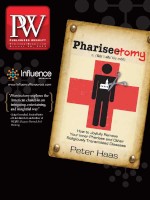“I think scholars often end up just writing for other specialists,” says Akhil Reed Amar, “and I think that’s particularly unfortunate when we’re talking about scholars of the American Constitution.” He produces a well-thumbed, pocket-sized copy from his jacket.
"Uniquely among all our laws, the Constitution is supposed to be for all citizens; it was designed to be a very short document, precisely so ordinary people could read it and decide whether they were for it or against it. So how could I not try to address my fellow citizens?”
Amar is explaining how a Yale law professor, author of scholarly articles on constitutional issues, came to write a series of books that aim to educate a general readership about the Constitution’s central importance in our history and in our present lives.
America’s Unwritten Constitution: The Precedents and Principles We Live By (Basic Books) is a companion piece to Amar’s 2005 work, America’s Constitution: A Biography. “What I’m trying to do is go beneath, behind, and beyond the written Constitution but always maintain a connection to it. I want to appeal to originalists who believe in the text and also to living constitutionalists. The way to do that is to understand that it is a constitution, with principles in it that are greater than the specific sentences. America’s two constitutions, the written and the unwritten, form a single constitutional system.”
As an example, he points to the Fourteenth Amendment, which declares that everyone born in the United States is a citizen and forbids states to “make or enforce any law which shall abridge the privileges or immunities of citizens.” This section of the written Constitution also forms the basis of a crucial portion of the unwritten constitution: the Warren Court’s “incorporation revolution,” a series of decisions holding that the Fourteenth Amendment takes various provisions of the Bill of Rights that had originally operated only against the federal government and applies them against the states.
“The world before the Warren Court is unrecognizable,” says Amar. “Even conservatives don’t want to go back to it. Today’s conservatives accept applying the Bill of Rights against the states; they say that’s true for the Second Amendment as well. They accept the idea of broad freedom of speech; we see that in Citizens United. They accept the basic premises of the Warren Court. My claim is that we’ve achieved a truce in the culture wars of the 1960s.”
Those who rebut this claim by pointing to today’s polarized political climate will be surprised by a chapter entitled “The Partisan Constitution,” which argues that the idea of a two-party system is embedded in the unwritten and the written constitutions. “Every single Republican except one voted for the Fourteenth Amendment,” notes Amar, “and every single Democrat voted against it. This isn’t the first time in our history where we’ve had this polarization. We’ve gone through many eras that were much bleaker than this, and look what we did: we began a transcontinental railroad in the middle of the Civil War; we built Hoover Dam during the Great Depression. Long term, democracies can right themselves.”
“I’m into this national greatness stuff,” Amar says with a self-deprecating grin—but he’s not really kidding. “I believe that the enactment of the Constitution in 1787 was the most epically democratic event in world history up to that point: imagine bringing together everyone across the continent for an entire year to talk about how they should be governed! It created a democratic momentum that we’re still feeling 225 years later throughout the world. In India, where my parents were born, a billion people are trying to follow the American model of liberal, pluralist, tolerant democracy; that’s happened basically in my lifetime.”
“I think one of the reasons the American Constitution has been my obsession is that, on the day I was born, my parents were not citizens—they weren’t here illegally; they were just graduate students in Ann Arbor. But the Constitution makes me a citizen: the first sentence of the Fourteenth Amendment made me a citizen on the day of my birth. It gave me this great gift that I have basically spent my life trying to repay.”
Wendy Smith, a contributing editor of the American Scholar, reviews books and profiles authors for the Washington Post, the Daily Beast, AARP, and other publications.



 Volume 259
Issue 34
08/20/2012
Volume 259
Issue 34
08/20/2012





